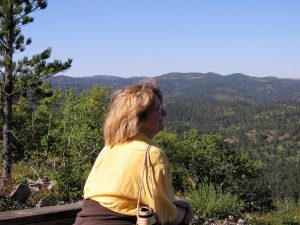A song for pilgrims ascending to Jerusalem.
I lift my eyes to you, O God, enthroned in heaven. We keep looking to the Lord our God for his mercy, just as servants keep their eyes on their master, as a slave girl watches her mistress for the slightest signal. Have mercy on us, Lord, have mercy, for we have had our fill of contempt. We have had more than our fill of the scoffing of the proud and the contempt of the arrogant (Psalm 123:1-4 NLT).
Next in the Psalms of Ascent (Psalms 120-134) is this short song. The human writer and the time of the writing of this song are unknown. Neither is important to understanding it. Like the others in this collection, it was composed for the worship of the Lord during the physical journey to Jerusalem, particularly at the required Festivals. Envision large groups of God’s old covenant people walking to the chosen city together. The very journey is celebratory and exciting. They move from the regular events of life to focus on the true and living God.
Like the previous psalm, it begins in the singular, but quickly moves to the plural. I lift my eyes to you… We keep looking…. Both singular and plural are important in the worship of the living God. Each believer must seek the Lord with his or her heart; all believers must join together in seeking God. One encourages the many; the many inspire the one. We can feel apathetic alone, and the zeal of others ignites a fire in us. A whole church might be listless, but the joy of one new worshiper can stir the existing ones to pursue God anew. While many of us have been able to gather digitally during the Covid-19 governmental restrictions against gatherings of many people, it has not been the same as meeting in person. We are glad for how we’ve been able to meet, but I wonder if some have begun to forsake the gathering of ourselves together (Hebrews 10:25). What will church gatherings look like in a couple months? You can be part of leading the way back to wholehearted worship.
The writer of Psalm 121 had to learn to lift up his eyes higher than the mountains to God. This lesson has been learned and the writer of this song lifts his eyes directly toward the Lord. In our day of religious confusion, many think it spiritually chic and sophisticated to lift up their eyes to nature, due to their pantheistic views. (By the way, what a deceptive term pantheism is, because if everything is god, then nothing is god. “God” or even “god” means a supreme being or deity of whatever conception.) Biblical teaching rightly directs us to the Lord God who is supreme over all people, forces, and things.
As the pilgrims journeyed toward Jerusalem and the temple, they sang of the one true God who reigns above the earth: O God, enthroned in heaven. The sovereignty of God is a major theme of the Bible. God tells us in the true story of his glory that he reigns, he rules, he is in charge of all things. This is a great comfort to the people of God, because this present world seems out of control. God reassures our troubled and confused hearts that he is still on the throne. The Spirit inspired the writer of this psalm to make that theme the first line of this song as they approached Jerusalem.
When we draw near to God, it is good that we remember that God is on the throne of the universe. We easily become overly familiar with the Holy One. We come to our Father, but he is in heaven. We might struggle to hold these two truths together. We need to view God as King while we also see him as Father. Our God who loves us is also holy and the absolute monarch. This provides us with much comfort and encouragement, when we acknowledge both in our lives. Together, these truth can transform our lives. Our Father-King is a reason to sing!
Before we leave verse one, we ought to notice our responsible action. I lift my eyes to you…. These words call us to refocus on the Lord (cf. Colossians 3:1-4; Hebrews 12:1-2). The purpose of the song is to rekindle adoration for the Lord in our worship. This cannot happen until we deliberately set our thoughts on him. O Lord God, use this song to refocus our hearts on you!
Grace and peace,
David

 Romans 12:3
Romans 12:3 Ruth 4:13-22
Ruth 4:13-22 Ruth 4:11-12
Ruth 4:11-12 Ruth 1:19-22
Ruth 1:19-22